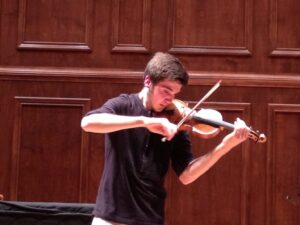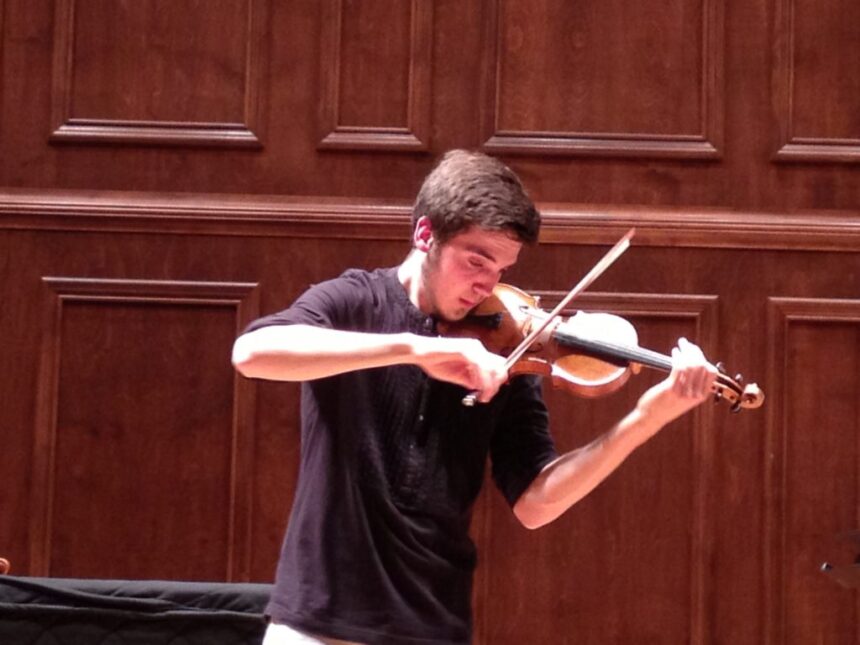
Stevan Lukich | Courtesy
After winning Hillsdale’s annual Concerto/Aria Competition on Sunday, four students have the rare chance to perform in concert with the college orchestra later this semester. Junior Stevan Lukich and senior Faith Liu will perform during the May orchestra concert, and sophomore Gregory Farison and junior Rachelle Ferguson will perform in March.
Lukich, who also won last year, said performing with the orchestra was a great experience.
“Playing with an orchestra really brings a piece to life,” he said. “The very best pianist in the world can do a fantastic job, but ultimately their part is just a reduction of the orchestra part. It adds a lot for the audience and as a performer too.”
For more than 15 years, the competition has attracted about 20 contestants each January, four or five of whom are chosen to perform in one of the orchestra’s two spring concerts.
Instruments auditioned this year included piano, viola, clarinet, flute, harp, and tuba. Music Department Chair James Holleman said this might be the first time a tuba player has entered the competition. Lukich and Ferguson are violinists, Liu a vocalist, and Farison a cellist. Violinists, vocalists, and pianists are typical winners due to their large repertoire, according to Holleman. He added that every year, at least one of the winners is a student of Director of String Studies Melissa Knecht.
According to participants, the competition this year was tough.
“Our conductor was commenting that this was probably one of the hardest ones,” Farison said. “The overall skill level of everyone competing was perhaps higher than it has ever been. The judges were pretty impressed.”
To participate in the competition, students must first receive the support of their studio teacher and have their pieces approved by Holleman. Freshmen are not allowed to audition because their pieces must have been learned at the college. Next, contestants begin practicing by the beginning of the fall semester, if not earlier. Farison already has a cello concerto in mind for next year, he said.
Liu had been practicing Rossini’s “Una Voce Poco Fa” for well over a year since she was unable to audition last January.
“I caught the flu the week before, and I had no voice,” Liu said. “I liked that piece well enough that I said, ‘I want to do it again, and I want to do it right.’”
Participants also must be enrolled in music lessons during the semester of preparation and the semester of the audition, and must participate in an ensemble with their instrument.
And of course, students must practice for hours.
“I put in between 2-3 hours a day for several weeks getting ready for it,” said Lukich, who performed Prokofiev’s Violin Concerto No. 2 in G minor.
For the day of the competition, Holleman invites three conductors from the Michigan area to judge. Bringing in a new set of judges provides impartiality and networks the college, he said. This year’s judges were Clayton Parr, the director of choral activities at Albion College; Arie Lipsky, the music director and conductor of the Ann Arbor Symphony Orchestra; and Mark Douglass, the director of bands at Spring Arbor University.
Other schools host similar competitions, some of which Holleman has judged. Some larger schools have multiple levels of auditions, while smaller schools can have as few as six contestants. Regarding Hillsdale’s competition, Holleman said he is thrilled by the quality of the students.
“It’s our music department, which is very diverse,” he said.
Students audition simply to perform with the orchestra, though some have also found it to be a networking opportunity, connecting to graduate schools or having professors at other schools offer to teach them.
“It’s kind of expected of you at this level,” said Liu, who is a double music and English major.
But the best part of the experience, Lukich said, is storytelling.
“Tenderness, sweetness, any of those kinds of emotions, I experience them more profoundly through music,” he said. “I hope the good part is other people experience that.”

